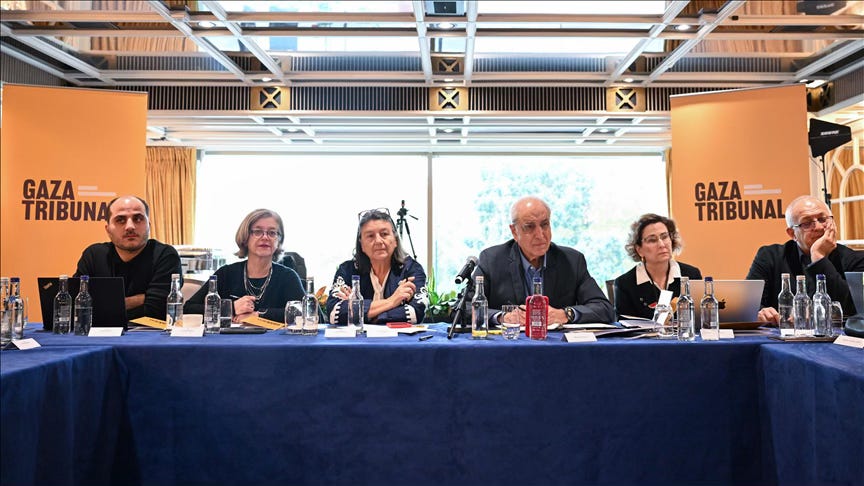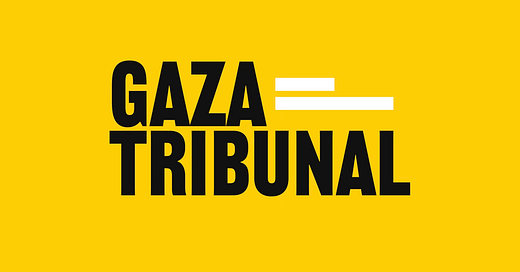A Gaza Tribunal emerged to break through institutional silence
A coalition of global voices gathered last week in London to confront the silence surrounding Gaza and demand accountability beyond institutional constraints
I find myself at a gathering destined to be dissected, cited, and scrutinized for years to come: the inaugural Gaza Tribunal in London. This isn’t your typical assembly of government-bound diplomats or detached intellectuals; this is a coalition of human rights advocates, legal experts, celebrated academics, and grassroots organizers. The names in this room over the next two days carry weight in the world of critical thought: Richard Falk, Michael Lynk, Susan Akram, Noura Erakat, Judith Butler, Cemil Aydın, Penny Green, Ussama Makdisi, Hilal Elver, John Reynolds, Diana Buttu, Ilan Pappe, and many others. Each brings a distinct history of intellectual and activist resistance, forming a collective response to the void mainstream narratives have left around Gaza.
This Tribunal isn't just a quest for legal transparency; it's a direct confrontation with the moral torpor that's plagued official bodies. Inspired by the likes of the 1966 Russell Tribunal on Vietnam—Bertrand Russell’s response to the silent complicity of the powerful—this Gaza Tribunal is set to challenge the inertia of the ICJ and ICC, bodies shackled by geopolitical constraints and labyrinthine bureaucracy.
Its mission is twofold: to document alleged crimes in Gaza with uncompromising rigor and to render judgments rooted in legal, historical, and ethical inquiry. Every phase of this Tribunal will be public, transparent, and digitally accessible, even broadcast live. The intention is clear: this record isn’t merely for contemporaries but for future scholars, activists, and anyone who insists on accountability in a world that often lacks it.

How will it work? Modeled on traditional international bodies but free from their entanglements, the Tribunal features a Grand Chamber and specialized panels focused on testimony, evidence analysis, and judgment. Scholars and rights advocates will draw on frameworks of genocide, apartheid, and occupation law, integrating both historical and customary international standards.
This isn’t a closed-off bureaucratic echo chamber; it’s an open forum—free from the plodding, politicized pace that paralyzes the ICJ and ICC. It will actively collaborate with civil society initiatives, including Palestinian organizations like Addameer, Al Mezan, BADIL Resource Center, Palestinian Center for Human Rights (PCHR), Palestinian Environmental NGOs Network (PENGON), Arab Group for the Protection of Nature (APN), Adalah - The Legal Center for Arab Minority Rights in Israel, Al-Haq, and Law for Palestine.
Another critical feature is the Tribunal’s strict 12-month timeline, ensuring its work remains swift, sharply focused, and shielded from the influences that so often cripple official courts. Swiftness is essential now.
Guiding this work is a Presidential Committee, supported by an Advisory Policy Council with leading figures from civil society, academia, and media. There’s a Secretariat to handle logistics and documentation, ensuring that each stage of the Tribunal is transparent, streamlined, and independent.
Here’s the crux: this Tribunal has no allegiance to any state, political faction, or vested interest. Its financial backing is claimed to come solely from anonymous individuals and human rights organizations, side-stepping the strings of institutional compromise. But let’s be candid—Turkish state-aligned initiatives support this Tribunal, with the Islamic Cooperation Youth Forum (ICYF), a group linked to the Organization of Islamic Cooperation, handling much of the administrative workload. Even so, the Tribunal’s leadership, particularly Richard Falk, insists that financial backers have no say in its processes.
So, can a Tribunal divorced from formal legal structures wield genuine influence? It lacks enforcement powers, yes—but its founders argue that moral authority, unburdened by the compromises of official channels, can be even more potent.
By appealing directly to global public opinion, this Tribunal aspires to fill the chasm left by institutional inaction, pressing for accountability where official bodies have faltered. Here, global conscience isn’t an abstract ideal; it’s the very foundation on which this Tribunal stands.
For me, the most compelling part is the determination to set the record straight. This isn’t simply a reaction to the latest crisis but an audacious bid to memorialize Gaza’s struggle, ensuring future generations can access the truth. It’s a call to arms for civil society to occupy the space abandoned by officialdom, to demand justice on its own terms. In the end, if the courts of law fail, let the court of public opinion bear witness. I'll keep you posted on its progress, findings, and timeline—this story is far from over.





